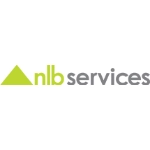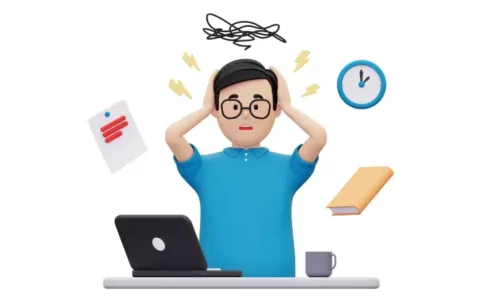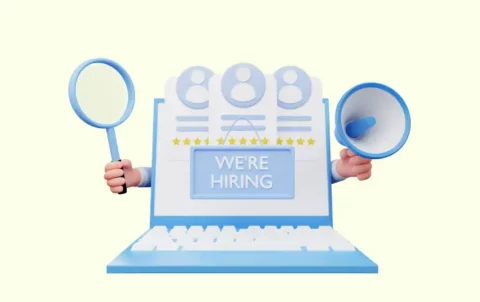© 2026 Next Level Business Services Inc. All Rights Reserved.
How Chatbots Are Transforming the Hiring Process
By NLB Services
As the job market becomes increasingly competitive, employers are actively seeking innovative ways to source, engage, and recruit candidates. AI-powered recruitment chatbots have been at the forefront of this transformational approach, proving to be an absolute game-changer for recruiters. These chatbots have completely revolutionized how employers source and interact with potential candidates, thereby facilitating enhanced candidate engagement and conferring a personalized experience incomparable to any other traditional methods out there. Buckle up as we begin to explore these aspects in greater detail, understanding the effects of these AI-powered measures on talent acquisition and overall employee experience.
What is a Recruitment Chatbot?
Recruitment chatbots are AI-powered messaging tools that markedly streamline the hiring process, moving potential employees from the initial interaction through each step of the job application process. These chatbots, in essence, act like hiring assistants wherein they answer the queries of candidates about the application process around the clock, inform them of the next steps, and in fact, also make recommendations to help candidates refine certain skills or qualities based on their interactions with them. These are just a few of the benefits offered by these chatbots. We will discuss these attributes and others in greater detail below. Brace yourselves as we take you on this informative journey.
Chatbots in Candidate Sourcing and Engagement
Automated Job Postings and Distribution
With the advent of AI-led chatbots, employers can now streamline the process of creating compelling job adverts, sure to capture the attention of potential candidates. By equipping chatbots with basic instructions outlining the pre-defined criteria employers are seeking in an employee, these chatbots can effectively amplify and transform that information into creative and engaging job offers, optimizing them specifically for different platforms, whether they be online or offline. This optimization maximizes their reach and impact. Needless to say, caution needs to be exercised in overseeing these processes to avoid any form of bias or erroneous information being generated that may go unnoticed if left unmonitored. Albeit, one can’t deny that it makes the job writing process, which can be quite complicated and nuanced in itself, much easier and more efficient. Think of it as a first draft that the organization can tweak and tailor until they are fully satisfied with the outcome. This approach allows employers to leverage the efficiency and convenience offered by these chatbots while also maintaining the control and vigilance required for quality job offers.
Candidate Screening and Qualification
When it comes to screening candidates and assessing their qualifications against the employer’s benchmarks and job description parameters, no amount of manual effort can supersede or match this intelligent technology’s efficiency and effectiveness. Powered with AI algorithms, these chatbots automate screening conversations between employers and candidates in a fraction of the time, substantially accelerating the hiring process to assess their eligibility. This enables recruiters to focus their resources and time on evaluating qualified candidates instead of reviewing a sea of applications. Recent advancements in AI have been marked with an inbuilt anonymity feature to safeguard applicants’ information and personal data to mitigate any potential risk of biased assessment. This anonymization process guarantees that candidates are evaluated solely based on their qualifications and merits, enhancing the objectivity of the screening process.
Improving Efficiency in the Hiring Process
Automated Interview Scheduling
Scheduling interviews, in general, is a tedious and time-consuming process. Coordinating times, and days or even handling last-minute cancellations can be a rather cumbersome experience. Today talent acquisition teams can focus and redirect their resources and time on other high-value activities of the hiring process, with AI chatbots automating interview scheduling and other pre-interview formalities. With the advent of AI chatbots, job seekers can self-book their interviews based on their availability and the time slots offered. This much-needed respite allows recruiters to invest all their energies in conducting interviews and assessing the candidate’s overall cultural fit, diving into their skills, area of expertise, and potential contributions to the organization.
Data-driven Decision-making
Despite being programmed on extensive pre-existing data sets, AI chatbots also generate data of their own at different points during the recruitment process. For instance, through their first-hand interactions with the employees, these chatbots can gather data regarding their skill sets, preferences, points of struggle, and areas requiring improvement. AI algorithms can then maneuver this generated data to make predictive analysis, identifying patterns in candidates’ behavior and anticipate expected outcomes to address their specific needs. Powered with these valuable insights, AI chatbots can recommend the best-suited candidates for the organization aligning them with suitable opportunities specifically tailored to their expertise and experiences. All in all, fuelled with this data-driven approach, employers can tailor and optimize their hiring strategies to attract quality candidates and amp up their talent acquisition efforts.
Enhancing Candidate Experience and Engagement
24/7 Availability and Instant Response
Throughout the recruitment process, it’s expected of candidates to have questions concerning the nature of the job, their role and responsibilities, application status, interview procedure, and more. As AI chatbots are programmed on natural language processing and machine learning, they are stimulated to respond with a conversational interface to answer their queries in real time, elevating the stresses of potential candidates with quick responses. Employers can easily integrate these chatbots within their websites and other social media platforms to offer round-the-clock support.
Personalized Recommendations and Feedback
Based on their interaction with candidates AI chatbots use that data to make personalized recommendations and suggestions. AI chatbots compare the answers of the candidates against pre-determined criteria to evaluate their performance and highlight areas of improvement. For instance, if a candidate has extensive job experience but lacks strong communication skills, AI chatbots can identify such limitations and provide relevant recommendations. These systems can update their algorithms on an ongoing basis, learning from their interactions with the candidates, thereby providing increasingly accurate and personalized feedback.
Reducing Bias in Hiring
As businesses progressively incorporate AI-powered recruitment chatbots, they also hone the risk of running into biased decision-making. To mitigate such shortcomings, it is crucial for businesses to formulate strategies that are in line with creating an inclusive and equitable hiring process. First things first, companies should carry out periodic audits to identify any biases perpetrating in the data sets these chatbots are trained on. It’s best to have people from diverse backgrounds at this stage since it allows for multiple and varied perspectives to be considered when making any potential modifications. We highly recommend starting such evaluations during the development process when designing chatbot interactions and assessments to lay the foundation for objectively selecting the candidates right at the onset. Additionally, feedback from concerned parties like recruiters, managers, and candidates can provide deeper insights into the workings of these systems to continually update and diversify the data sets these chatbots are trained on. Anonymizing personal information of the candidates, like age, gender, marital status, or ethnicity, likely to vehicle any form of biased decision-making can counteract the aforementioned risks. This ensures that chatbots solely rely on the qualifications and skill sets of potential job seekers to identify the best-suited candidates instead of relying on irrelevant attributes. Companies are not just legally bound to ensure equality throughout the hiring process, but it’s also their moral and ethical duty to give all job candidates a fair shot at the job position.
Future Trends and Considerations
Al-led Chatbots are bound to have a significant impact on the hiring process in the future. Developments in Natural Language Understanding (NLU) would further promote human-like interaction amongst candidates leading to even better engagement and overall experience being conferred to candidates with the existing technology. These chatbots are expected to become better equipped to gauge candidates’ emotional responses through emotion recognition abilities, thus presenting managers insights into their behavioral reactions. Multimodal chatbots, built-in with the ability to comprehend instructions and respond in voice, visual, and text outputs, would offer vast and diverse channels for communication catering to various needs and preferences.
Moreover, chatbot performance will continuously improve owing to personalized learning algorithms tailored to specific candidate needs. With advancements being made at correcting algorithm bias, ensuring ethical consideration and bias mitigation would become increasingly seamless, thereby promoting inclusivity and fairness. ATS and HR system integration would simplify recruiters’ jobs by streamlining the hiring process. Lastly, as Augmented Reality gains popularity in this domain, virtual interviews may be facilitated, providing a comprehensive skill assessment. While embracing these trends, it is imperative to safeguard data privacy and carry out regular audits for chatbot interactions are strike a balance between human interventions and automation touch. Chatbots in the hiring process seem to have a promising future revolutionizing the hiring process, thereby providing more efficient and fair engaging experiences for recruiters and candidates.
Conclusion
To stay ahead in the competitive job market, embracing AI hiring has evolved from being an option to more of a necessity. It’s only a matter of time before talent acquisition becomes heavily influenced by AI-led technology to screen, source, and select candidates. This in no way is suggestive that human intervention will no longer be required in the recruitment processes, but AI-powered technology can take care of many repetitive tasks allowing recruiters to focus on high-value activities. As the hiring landscape undergoes a revolution, organizations should leverage this cutting-edge technology to amp up their hiring game. By integrating AI into their recruitment processes, businesses can stay ahead of the curve and effectively respond to the dynamic demands of the job market.
Talent Solutions








